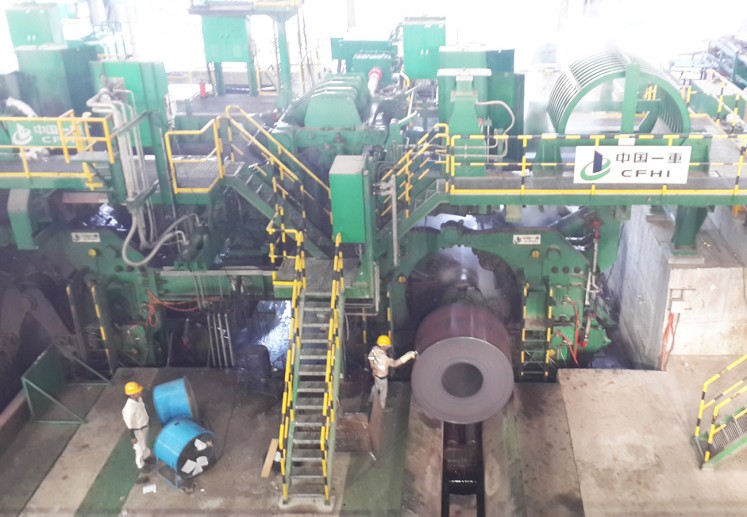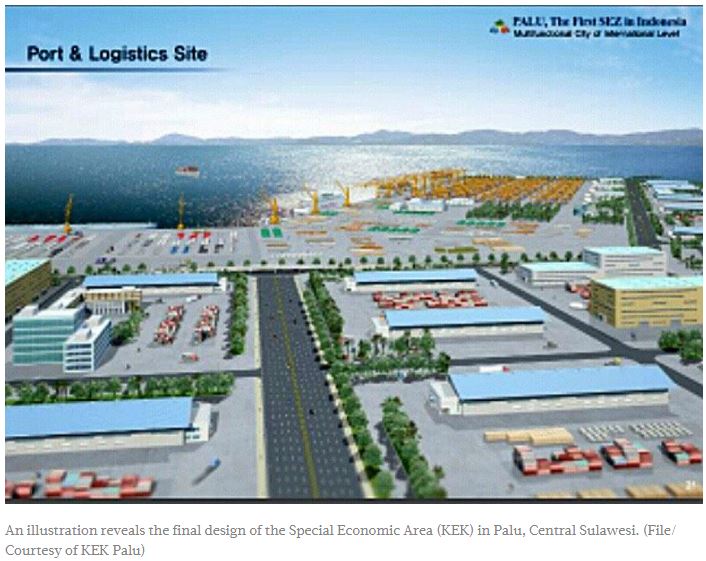Indonesia: Central Sulawesi sets Rp 20.08t investment target to boost growth
Central Sulawesi has set its sights on generating Rp 20.08 trillion (US$1.42 billion) in investments this year, following the earthquake and tsunami of Sept. 28, 2018 that particularly devastated the provincial capital of Palu and surrounding areas.
Data from the Online Single Submission (OSS) system show that 400 local and foreign investors are interested in the province.
“We are optimistic that we can achieve this target, because many investors want to do business in Central Sulawesi, in both the Special Economic Area (KEK) in Palu and the Morowali industrial estate,” said Central Sulawesi Governor Longki Djanggola on Tuesday, after attending the Regional Investment Forum 2019 in Palu.
Along with all regents and mayors in the province, the forum saw the attendance of representatives from 150 companies that are investing or seeking to invest in the province.
Longki said the target was set to achieve 6.8 percent growth in the provincial economy this year. He added that he was optimistic that the target would be achieved, because the province had recorded economic growth of 6.3 percent in early 2019.
The Indonesian economy recorded 5.17 percent growth in 2018.
“It means that the National Development Planning Agency’s (Bappnas) concerns that economic growth in Central Sulawesi would slow will not occur. Our economic growth will improve,” the governor said.
He added that although many investors had expressed interest in investing in the province, a number of barriers still remained because of poor electricity access and the poor condition of roads and seaports.
“In Central Sulawesi, including Palu, we still see frequent blackouts because of the electricity shortage,” said Longki. State-owned electricity company PLN was expected to immediately address the shortage to allay investors’ doubts about entering the province.
On the other hand, Longki guaranteed a smooth licensing process as long as investors met all requirements under prevailing laws. For example, investment permits for KEK Palu could be processed within an hour.
President director Andi Mulhanan Tombolotutu of PT Palu Bangun Sulawesi Tengah (BPST), which manages KEK Palu, said that two companies were currently operating in the area: pine resin manufacturer PT Hong Thai International and energy trading company PT Asbuton Jaya Abadi.
“The two companies have been operating in KEK Palu for a year and PT Hong Thai is exporting its products to China, Thailand and India,” said Andi.
 AA worker marks a stainless steel hot rolled coil (HRC) that just came out from the machine in Morowali Industrial Park’s HRC plant in Morowali, Central Sulawesi, on Sept. 18, 2017. The industrial complex smelts nickel and processes it into stainless steel. (JP/Stefani Ribka)
AA worker marks a stainless steel hot rolled coil (HRC) that just came out from the machine in Morowali Industrial Park’s HRC plant in Morowali, Central Sulawesi, on Sept. 18, 2017. The industrial complex smelts nickel and processes it into stainless steel. (JP/Stefani Ribka)
Meanwhile, five other companies were building factories in the KEK, including magnesium manufacturer PT Indo Mangan Industri and PT Hashimoto Gemilang Indonesia, which produces chips using palm kernel shells. The other companies were a smelter operator, an active carbon producer and a coconut products manufacturer. Andi said the combined investment of the five companies totaled more than Rp 5 trillion.
KEK Palu had also signed a cooperation agreement with state-owned security and defense manufacturer PT Pindad Indonesia to supply 36 products in eastern Indonesia.
PT Indonesia Morowali Industrial Park (IMIP) senior vice president Slamet Viktor Panggabean said the park currently had 29 companies that filled only 30 percent of the 2,000-hectare industrial park.
Slamet added that three other companies, including a carbon steel producer, would soon start building factories in the park. The planned development included a lithium battery factory that would be the largest of its kind in Southeast Asia. “They are arranging their permits [now],” he added.
About 201,000 foreign workers and 31,000 local workers were currently employed in the IMIP. Slamet said the industrial park planned to establish a manufacturing polytechnic university to gradually reduce the number of foreign workers over the next five years. “We need a lot of workers. One factory needs about 1,500 workers,” he said. (bbn)
Source: https://www.thejakartapost.com/news/2019/04/11/central-sulawesi-sets-rp-20-08t-investment-target-to-boost-growth.html


 Thailand
Thailand




